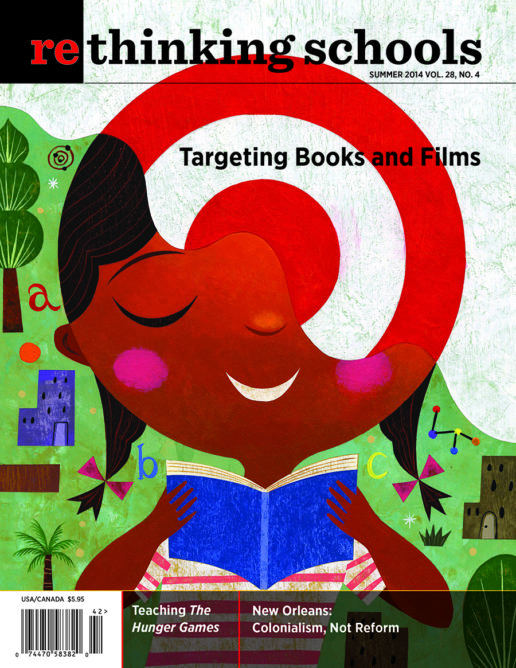Targeting Books and Films
Illustrator: Ethan Heitner

The privatization of public schools comes in many guises, as San Francisco teacher-librarian Rachel Cloues shows in her article in this issue, “The Library that Target Built.” We live in an era of stagnating or declining revenues for public education, yet vast wealth for corporations. And that fact leaves schools vulnerable to rich people bearing gifts.
Cloues tells a story that is both comical and outrageous. Target, hoping to nurture a reputation as a community- and kid-friendly store as it gained entre into the San Francisco market, offered to build a library for a school in need. Cloues was on hand to watch this drama unfold—in her own library. In big and little ways, Target sought to brand children and the curriculum.
Longtime Rethinking Schools readers will remember Cloues’ earlier piece, “My Year with Nike,” about Nike’s “partnership” with her then-elementary school in Beaverton, Oregon. That corporation-school relationship was just as problematic. As both stories underscore, private profit and public education are fundamentally different objectives.
Cloues’ Target essay is part of a cluster of articles in this issue that focus on how teachers can thoughtfully engage students with books and films. Beth Marshall, co-editor of our book Rethinking Popular Culture and Media, teams with Matthew Rosati to describe how they involve students in thinking about power and social class through use of the wildly popular Hunger Games series in “May the Odds Be Ever in Your Favor.” Their article recounts an imaginative blend of popular culture, exploration of profound inequality in wealth and power, and lively pedagogy.
Elementary teacher Willow McCormick was dismayed at how many of the books in her classroom library presented only one version of the family: mom, dad, and kids, whether human or animal. Think Berenstain Bears. As McCormick writes, “When two-parent, heterosexual families are presented as the norm in story after story, year in and year out, an insidious message is conveyed: Families that don’t conform to this structure are not normal.” McCormick tells how she uses one book that breaks the mold, Susan Kuklin’s Families, and describes teaching activities that acknowledge diverse family structures that better reflect the lives of her students, as well as the broader society.
Also in this popular media section, Jeremy Stoddard reviews the wrenching film 12 Years a Slave and wonders about its use with students. As Stoddard points out, 12 Years a Slave offers the kind of unblinking look at slavery that is rare in video resources available to teachers—and it avoids some of the pitfalls of earlier films. But Stoddard, a teacher educator, stops short of recommending it for classroom use. What are the limits of racist cruelty and exploitation that we can depict in the classroom—even when these are historically accurate, and nuanced by resilience and resistance? We invite Rethinking Schools readers to share your thoughts.
As we try to do with every issue of the magazine, other stories balance portrayals of practical and engaging classroom teaching with vital policy issues. In “Singing Up Our Ancestors,” Rethinking Schools editor Linda Christensen introduces students to Myrlin Hepworth’s extraordinary performance poem “Ritchie Valens.” In “Carbon Matters,” Jana Dean, who has written frequently for us through the years, encounters parent resistance when she teaches about global warming—and responds by plunging deeper into the science of carbon emissions. And first-time contributor Samia Shoman demonstrates how she approaches teaching the Palestinian Nakba catastrophe and the birth of Israel through exploring conflicting narratives. On the policy front, our interview with parent activist Karran Harper Royal details the educational “disaster capitalism” unleashed on New Orleans after Hurricane Katrina.
Remember, coming up in the fall are several social justice education conferences: Teachers 4 Social Justice in San Francisco, Northwest Teaching for Social Justice in Portland, National Association for Multicultural Education (NAME) in Tucson, and Teachers for Social Justice in Chicago. Rethinking Schools editors will be presenting at all of them. Now, more than ever, educators, parents, and all people of conscience need to gather face to face to share experience and analysis, and support one another through these dangerous times. Please join us.

